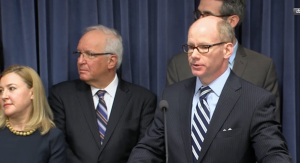Democrats issue their own ‘Illinois Comeback Agenda’
By Jean Lotus Staff Reporter — April 4, 2017
State Sen. Don Harmon (D-Oak Park) and a group of Democrat legislators introduce the “Illinois Comeback Agenda” March 29. (Blueroomstream)
“Where’s the Democrat Turnaround Agenda?”
This was the rhetorical question posed in 2016 by columnists and political analysts in Chicago and downstate after the first year of budget impasse in the General Assembly. Gov. Bruce Rauner’s campaign promises of reforming income taxes, redistricting and workman’s compensation were still relatively new, and Democrats in the General Assembly were becoming seen as obstructionists.
A year later, 21 months without a budget, and after a “Grand Bargain” suite of bills fell apart in the Senate, rank-and-file Democrats and newcomers finally responded with an “Illinois Comeback Agenda” released March 29. A website with the proposal was launched at www.combackil.com.
“A handful of us were so frustrated with the lack of progress and the inability to move any agenda forward,” said Senate Leader Pro-Tem Don Harmon (D-Oak Park).
“We had a real sense from our constituents that they felt like Springfield was broken and that it wasn’t working for them.”
The plan provides “progressive, forward-looking” ideas in five areas: Fixing the Illinois state budget, jobs and economic growth, campaign finance reforms, education funding, and criminal justice reforms.
Democrat leaders from both houses showed up at a press conference to roll out the plan. These included House Leader Michael Madigan’s right-hand woman State Rep. Barbara Flynn Currie (D-Chicago) and Sen. Heather Steans (D-Chicago), appropriations chair. But relative newcomers were present as well, such as Rep. Will Guzzardi (D-Chicago), Carol Ammons (D-Urbana) and Sen. Omar Aquino, (D-Chicago).
The Democrats’ plan differs from Rauner’s in several ways: Democrats call for a graduated income tax, which would require an amendment of the Revenue Article of the Illinois Constitution.
“There’s quiet support among Republicans,” said Harmon, who has introduced legislation in the past that he said would lower taxes for “94 percent” of Illinois residents.
Guzzardi said as income among the top earners in Illinois increased, it made sense for state taxation to follow. Rauner’s Turnaround Agenda called for a property tax freeze and Rauner’s 2018 budget only reluctantly proposed raising the Illinois flat income tax back up to around 5 percent from 3.75 percent.
The new Democrat plan calls for a series of “ground up” economic boosts aimed at giving more economic power to lower-income people in the state. These include a proposed $15-per-hour minimum wage, ending corporate tax credits, expanding the Earned Income Tax Credit, earned sick time and family leave, equal pay for women and rebuilding infrastructure with workers from low-income areas. Rauner’s plan seeks to make Illinois more “business friendly” with a “top down” approach by reforming workman’s compensation laws and streamlining business services from the state and creating public-private partnerships on Illinois infrastructure projects.
Rauner’s plan called for redistricting reform to dislodge incumbents from their seats, but the Democrats see redistricting as an attempt to take representation from communities of color, Democrats said. Instead, the Comeback Agenda proposes leveling the playing field with a campaign “Small Donor Democracy Matching Fund” to allow lower-budget campaigns to compete with billionaire-financed campaigns — such as Rauner’s.
Both the governor and the Democrats have focused on fixing Illinois’s school funding mechanism, which some have called the most inequitable in the country because it depends so heavily on local property taxes.
The Democrat plan also addresses the funding crisis in Illinois higher education, which they say is neglected by Rauner.
“Higher Education as we know it in the state as we know it is adrift,” said Sen. Pat McGuire, (D-Bartlett) who serves as Chair of the Higher Education Committee. “[Institutions of higher education] going to crash on the rocks and break apart.”
Even though a higher education gap-spending was passed with bi-partisan support in the General Assembly, McGuire believes Rauner has neglected higher education. “Job creators don’t get excited by term limits, job creators get excited by a skilled, educated workforce,” he said.
The governor just signed a criminal justice reform bill into law that relaxed parole options for people convicted of 2nd Degree felonies. The new law also moves forward to provide back psychological services for victims of crime and those caught up in the criminal justice system.
The Democrats plan goes further with a plan, supported by Cook County Sheriff Tom Dart and Cook Co. President Toni Preckwinkle to eliminate the cash bail system, which critics believe keeps low-income people in jail before their court date and contributes to more guilty pleas.
Republicans were quick to criticize the Democrats’ new agenda.
“While it’s nice to see Democrats join the governor on criminal justice reform and improving schools, it’s alarming that their agenda appears to include nothing to lower property taxes or increase jobs throughout the state,” said a statement from Illinois Republican Party Spokesman Steven Yaffe.
“And any effort to fix the political system that doesn’t include term limits or redistricting reform isn’t a serious one. Illinoisans want a balanced budget with real spending caps, a true property tax freeze, and economic reforms to grow jobs. Democrats should add these key items to their agenda if they are serious about improving Illinois.”
— Democrats issue their own ‘Illinois Comeback Agenda’ —







